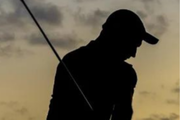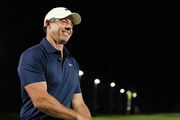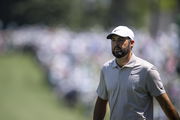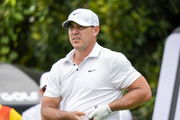
Imago
Image Credit: IMAGO

Imago
Image Credit: IMAGO
The leading headline of the ongoing 2025 PGA Championship? Turtles, snakes, and slow play! Everything was going according to plan until it wasn’t. On Day 1, it didn’t take a bale, but just one snapping turtle in the bunker to give Ryan Gerard quite a nasty shock on the 14th. A team had to prod it out, and it cost a good few minutes to get the sand competition-ready back again. Day 2? Snakes on the 10th, but fortunately, Shaun Micheel, the 2003 PGA Championship winner, made it out safe. Quite a dramatic start to the back nine, but was there more to the delays than what meets the eye?
Watch What’s Trending Now!
This will be a timely reminder here to note that, not too long ago, the PGA Tour launched a ‘Fan Forward Initiative’ that collected insights from more than 50,000 respondents in 2024. Excuse the sarcasm, but surprise, surprise, the pace of play turned out to be the biggest contention. It didn’t take too long for the PGA Tour to get a move on—a ‘Speed of Play Working Group,’ that will work alongside the PGA TOUR Player Advisory Council (PAC) and PAC Subcommittees, was created just two months back. Not only this, they went on to revise the Pace of Play Policy, which currently looks like this:
Firstly, unlike how a one-stroke penalty wasn’t applied until there’s a second offense of “bad time,” players now will receive such penalties in the first offense itself. Secondly, a player is allowed 40 seconds to play a stroke, and an extra 10 seconds is given on specific strokes. Thirdly, a group or individual players will receive an official warning if and when the Rules Committee determines they are starting to fall behind or are out of position. This comes as soon as they identify it, and will be given only once during a round. And this is exactly what seems to have happened to Justin Thomas and Collin Morikawa during Friday’s second round of the 2025 PGA Championship. A PA golf correspondent, Phil Casey, reported,
ADVERTISEMENT
“Thomas/Morikawa warned for slow play according to on-course reporter – and not happy about it.” Contrary to the fact that the turtle incident led to Patrick Cantlay to draw public ire on the internet, it was Thomas and Morikawa who were reportedly cautioned after the 12th hole, visibly frustrated by the timing and implication. Ironically, both players have recently supported calls for more transparency around pace-of-play data. “I’m on the slow side of players,” Thomas admitted earlier this year. “I want to know why I’m slow.” Morikawa, too, added, “If you’re slow, you know you’re slow. If you don’t know, then there’s an issue.”
Thomas/Morikawa warned for slow play according to on-course reporter – and not happy about it @PGAChampionship
— Phil Casey (@pcaseysafc) May 16, 2025
Thomas had already endured a chaotic first round, finishing with his sock and shoe off as he tried to play a ball from a creek-side lie. His round included five birdies, five bogeys, and a double bogey — the definition of rollercoaster golf. He carded a 2-over 73 and sits at T73 midway through the 2nd round. Morikawa, meanwhile, played solidly but drew attention for a costly misjudgment on the 18th hole Thursday, slicing his ball into the water from a difficult lie. Sky Sports commentators called it “extraordinary” and “one of the sillier decisions” they’d seen. Despite the error, he sits at T24 after the 1st round.
ADVERTISEMENT
With muddy conditions and long waits already testing player patience, the warning adds yet another twist to a week where slow play has dominated the headlines, just not in the way anyone expected. The timing of the warning couldn’t be more relevant, as it comes amid the Tour’s broader effort to curb delays and modernize pace-of-play policies across all levels of competition. Recent initiatives include the temporary use of distance-measuring devices (DMDs) at select events such as RBC Heritage and Truist Championship, and a revised penalty structure on the Korn Ferry Tour, where even a first “bad time” now results in a one-stroke penalty. While still in the trial phase, Tour officials hope these measures will drive lasting change. But as officials work to clean up the pace of play, another mess—this one quite literal—has stirred fresh controversy and player frustration at Quail Hollow.
Top Stories
DP World Tour Pro Punished for Failing Doping Test With Lengthy Suspension Verdict

Nelly Korda Rips Into Tiger Woods’ Women’s League as She Questions Charley Hull & Co. Over Silence

Camera Catches Rory McIlroy Taunting Patrick Cantlay Over Painfully Slow Golf Habit

Farmers Insurance Open 2026: 5 Biggest Names Absent From the $9.6 Million Event

Brooks Koepka Talks Nerves, Tiger Woods, and Feeling Accepted Again Before His First PGA Tour Start

ADVERTISEMENT
Mud balls create chaos at Quail Hollow
Scottie Scheffler didn’t mince words after round one of the 2025 PGA Championship. “When you think about the purest test of golf, I don’t personally think that hitting the ball in the middle of the fairway should get you punished,” he said. But that’s exactly what’s happening at Quail Hollow—thanks to mudballs.
So, what are mudballs? After heavy rain, wet turf can cause golf balls to embed into the ground upon landing, collecting clumps of mud. These clumps drastically affect a shot’s spin and direction. In normal conditions, the PGA Tour would invoke “preferred lies,” allowing players to lift, clean, and replace balls in the fairway. But at majors like the PGA Championship, the tradition of “play it as it lies” reigns, making mudballs part of the challenge.
Scheffler wasn’t alone in his frustration. “Due to a rules decision, that is completely taken away from us by chance,” he added. Jordan Spieth echoed this after a mudball-marred performance at the Masters, calling them “daggers” on key holes. With preferred lies off the table and mud a persistent factor, players are left navigating fairways where perfect drives can lead to unpredictable results, turning golf’s most fundamental skill into a gamble.
ADVERTISEMENT
ADVERTISEMENT
ADVERTISEMENT
ADVERTISEMENT
